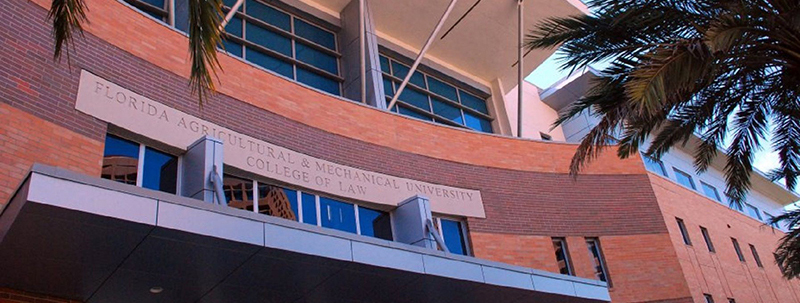






Florida Agricultural and Mechanical University (FAMU)
Student Achievement
FAMU Student Achievement – 2021
Updated April 30, 2021
Florida Agricultural and Mechanical University (FAMU) is accredited by the Southern Association of Colleges and Schools Commission on Colleges (SACSCOC). The SACSCOC Policy on Institutional Obligations for Public Disclosure requires that member institutions publish “statements of its goals for student achievement and the success of students in achieving those goals.” FAMU uses several measures to evaluate student achievement and success in accordance with the University mission and strategic plan.
Specific University measures for student achievement include the following:
- Improvement of retention and graduation rates.
- Being among the nation’s leaders in the number of degrees granted to African-Americans, an important constituency group at the University.
- Having examination/certification exam pass rates for FAMU graduates greater than the overall national/state pass rates.
- Having job placement rates greater than the average of the other State University System institutions.
Florida Agricultural and Mechanical University is an 1890 land-grant institution dedicated to the advancement of knowledge, resolution of complex issues and the empowerment of citizens and communities. The University provides a student-centered environment consistent with its core values. The faculty is committed to educating students at the undergraduate, graduate, doctoral and professional levels, preparing graduates to apply their knowledge, critical thinking skills and creativity in their service to society. FAMU’s distinction as a doctoral/research institution will continue to provide mechanisms to address emerging issues through local and global partnerships. Expanding upon the University’s land-grant status, it will enhance the lives of constituents through innovative research, engaging cooperative extension, and public service. While the University continues its historic mission of educating African Americans, FAMU embraces persons of all races, ethnic origins and nationalities as life-long members of the university community.
Strategic Plan Goals Related to Student Achievement
Strategic Priority 1: Exceptional Student Experience
Goal 1: Enhance pathways to degree attainment
Goal 2: Achieve national distinction for success in retention and graduation rates
Goal 4: Increase the number of students graduating from programs in areas of employer demand
Goal 5: Strategically enhance campus residence, athletic, recreational, instructional and research facilities.
Retention, Progression and Graduation Rates
The University uses retention, progression and graduation rates to evaluate student success. This information is reported annually in the Florida Board of Governors (BOG) Annual Accountability Report. The following table provides data for 1st to 2nd year retention rates of first-time, full-time, degree-seeking students (see Tables 1 and 2 below).
Table 1. 1st to 2nd Year Retention Rates: Full-time, First-Time-in-College (FTIC) Retention Rates - Retained in the Second Fall Term at Same University
Term of Entry | 2011-12 | 2012-13 | 2013-14 | 2014-15 | 2015-16 |
2016-17 |
2017-18 | 2018-19 |
2019-20 |
Retention | 80% | 82% | 81% | 85% | 83% | 82.6% | 79% | 80% | 85% |
Source: 2020 Accountability Plan; IPEDS
Table 2. Full-time, First-Time-in-College (FTIC) Six-Year Graduation Rates
Term of Entry | 2006-12 | 2007-13 | 2008-14 | 2009-15 | 2010-16 |
2011-17 |
2012-18 | 2013-19 |
2014-20 |
% Graduated | 40% | 41% | 40% | 39% | 41% | 47% | 50% | 52% |
55% |
Source: 2020 Accountability Plan
Position in National Ranking of Number of Degrees Awarded to African Americans
The University uses its position in national rankings of degrees awarded to African-Americans to evaluate student success. Florida A&M University continues to remain one of the top producers of African American students earning baccalaureate degrees. According to the most recent Diverse Issues Top 100 Degree Producers, FAMU is ranked as one of the top 10 producers of African American baccalaureates (see Table 3 below). For all disciplines combined, FAMU is ranked #9 for the total number of baccalaureate degrees awarded to African Americans in the 2018-2019 academic year.
Table 3. Diverse Issues Top 10 Baccalaureate Degree Producing Majors for FAMU
Rank | Baccalaureate Degree Major |
2 | Agriculture, Agriculture Operations, and Related Services |
3 | Architecture and Related Services |
3 | Multi/Interdisciplinary Studies |
4 | Natural Resources and Conservation |
5 | Health Professions and Related Programs |
7 | Engineering Technologies and Engineering-Related Fields |
9 | All Disciplines Combined |
9 | Communications, Journalism, and Related Programs |
10 | Biological and Biomedical Sciences |
2020 Diverse Issues, Top 100 Degree Producers Rankings 2018-19 Data
According to Diverse Issues in Higher Education, Top 100 Producers, 2020, FAMU is ranked as one of the top 10 producers of African American graduates at the master’s level in the nation for the majors listed below in Table 4.
Table 4. Diverse Issues Top 10 Master’s Degree Producing Majors for FAMU
Rank | Master’s Degree Major |
3 | Architecture and Related Services |
3 | Social Sciences |
5 | Agriculture, Agriculture Operations, and Related Services |
5 | Rehabilitation and Therapeutic Professions |
6 | Physical Sciences |
8 | Pharmacy, Pharmaceutical Sciences, and Administration |
2020 Diverse Issues, Top 100 Degree Producers Rankings 2018-19 Data
For professional degrees, FAMU ranked #1 as a producer of degrees awarded to African Americans in Pharmacy, Pharmaceutical Sciences, and Administration. FAMU ranked #2 in the nation for all professional disciplines combined. FAMU also ranked #4 in degrees awarded to African Americans in Rehabilitation and Therapeutic Professions. ForLaw, FAMU ranked #5 in the nation by Diverse Issues in the production of African American graduates earning a first professional degree below in Table 5.
Table 5. Diverse Issues Top Ten (10) Professional Doctoral Degree Producing Majors for FAMU
Rank | Professional Doctoral Degree Major |
1 | Pharmacy, Pharmaceutical Sciences, and Administration |
2 | All Disciplines Combined |
4 | Rehabilitation and Therapeutic Professions |
5 | Law |
2020 Diverse Issues, Top 100 Degree Producers Rankings 2018-19 Data
According to Diverse Issues in Higher Education, Top 100 Producers, 2020, FAMU ranked as one of the top 10 producers of African American graduates at with a Doctor’s-Research/scholarship level in the nation for the majors listed below in Table 6.
Table 6. Diverse Issues Top Ten (10) Doctor’s Research Degree Producing Majors for FAMU
Rank | Doctor’s Research Degree Major |
2 | Pharmacy, Pharmaceutical Sciences, and Administration |
4 | Natural Resources and Conservation |
6 | Engineering |
8 | Physical Sciences |
8 | Public Health |
2020 Diverse Issues, Top 100 Degree Producers Rankings 2018-19 Data
Table 7, below reports the top 20 institutions in the nation that awarded baccalaureate degrees to African-Americans in 2018-19.
Table 7. National Ranking of Baccalaureate Degrees Awarded to African-Americans in 2018-19
Rank | Institution | Bachelor's Degrees Awarded to African Americans |
1 | University of Phoenix-Arizona (for profit) | 5,801 |
2 | Walden University | 4,400 |
3 | Grand Canyon University | 4,283 |
4 | University of Maryland Global Campus | 3,763 |
5 | Ashford University | 3,189 |
6 | Broward College | 2,831 |
7 | Ultimate-Medical Academy-Clearwater | 2,814 |
8 | Liberty University | 2,688 |
9 | Georgia State University | 2,595 |
10 | Southern New Hampshire University | 2,588 |
11 | Capella University | 2,330 |
12 | Western Governors University | 2,292 |
13 | Miami Dade College | 2,160 |
14 | Purdue University Global | 1,972 |
15 | University of Central Florida | 1,881 |
16 | Florida International university | 1,843 |
17 | American Public University System | 1,808 |
18 | Florida Agricultural and Mechanical University | 1,785 |
Source: National Center for Education Statistics, IPEDS, AY 2018-19 Data
Licensure Pass Rates
The University uses licensure pass rates to evaluate student success. Table 8 below reports the pass-rates of examinees for the respective licensure examination for programs.
Table 8. Professional Licensure/Certification Exams
Nursing: National Council Licensure Examination for Registered Nurses | |||||||||
| 2012 | 2013 | 2014 | 2015 | 2016 | 2017 | 2018 | 2019 | 2020 |
First-time Pass Rate |
90% |
74% |
64% |
78% |
76% |
64% |
82% |
63% |
67% |
Law: Florida Bar Exam |
| ||||||||
| 2012 | 2013 | 2014 | 2015 | 2016 | 2017 | 2018 | 2019 | 2020 |
First-time Pass Rate |
67% |
73% |
73% |
66% |
54% |
50% |
47% |
57% |
58% |
Pharmacy: North American Pharmacist Licensure Exam |
| ||||||||
| 2012 | 2013 | 2014 |
2015 |
2016 |
2017 |
2018 |
2019 | 2020 |
First-time Pass Rate | 88% | 85% | 89% |
85% |
59% |
74% |
75% |
83% |
83% |
Physical Therapy: National Physical Therapy Examinations (Multi-Year) |
| ||||||||
| 2012 | 2013 | 2014 |
2015 |
2016 |
2017 |
2018 |
2019 |
2020 |
Ultimate Pass Rate |
95% |
85% |
92% |
77% |
92% |
96% |
91% |
100% |
91.7% |
Occupational Therapy: National Board for Certification in Occupational Therapy Exam |
| ||||||||
| 2012 | 2013 | 2014 |
2015 |
2016 |
2017 |
2018 |
2019 |
2020 |
First-time Pass Rate |
63% |
92% |
92% |
65% |
68% |
100% |
87% |
71% |
TBD |
Cardiopulmonary Sciences: National Board for Respiratory Care Examination (NBRCE) |
| ||||||||
| 2012 | 2013 | 2014 | 2015 | 2016 | 2017 | 2018 | 2019 | 2020 |
Overall Pass Rate |
78% |
91% |
100% |
100% |
100% |
100% |
100% |
90.9% |
TBD |
Annual Accountability Plan; Academic Affairs
National Survey of Student Engagement (NSSE)
The University uses the National Survey of Student Engagement (NSSE) to evaluate student success. The NSSE instrument is another means to help FAMU determine whether its graduates are prepared for the workforce. The results of the 2017 NSSE administration at FAMU demonstrate that students are generally satisfied with the various aspects of their college experience. A pertinent question on the NSSE asks students, "How much has your experience at this institution contributed to your knowledge, skills, and personal development in the following areas: Acquiring job or work-related knowledge and skills." Results of the 2017 NSSE indicate that the Percentage of Seniors Responding “Very much” or “Quite a bit” was 75%, which is a 3% increase over the 2014 administration.
Graduate Exit Survey
The University uses the Graduate Exit Survey to evaluate student success. The Graduate Exit Survey is used by the University to gather information on the college experience and the long-term impact to students. The exit survey is designed to provide information about graduating students on both undergraduate and graduate levels by soliciting feedback regarding their experiences at FAMU and their future plans. Ninety-five percent (95.4%) of the respondents in 2018-19 agreed that they had obtained a sense of competence in their major and 96.1% agreed that they had acquired the ability to apply theoretical knowledge to a practical situation. Furthermore, eighty-one (80.6%) percent of graduates had already accepted a job offer or were confident in finding employment related to their major.
Post-Graduation Data
Table 9 below reports the percent of recent baccalaureate graduates who are either employed full-time or continuing their education within one year after graduation. (Note: The data is based on the percent found employed or enrolled available from the Florida Education and Training Placement Information Program (FETPIP), Wage Record Interchange System 2 (known as “WRIS 2”) and Federal employee and military data that is available from the Federal Employment Data Exchange System (FEDES) initiative).
Table 9. Post-Graduation Metrics: Percent of Bachelor’s Graduates Employed Full-time or Continuing their Education, One Year After Graduation
Metric | 2012-13 | 2013-14 | 2014-5 | 2015-6 | 2016-17 | 2017-18 | 2018-19 |
Percent Found Employed or Enrolled |
60% |
69% |
70.1% |
73% |
73% |
73% |
69.1% |
Source: Annual Accountability Plan, Board of Governors Report
Contact Info
Tallahassee, Fl 32307
P: 850.599.8316
F: 850.599.8321
E: sacsinfo@famu.edu

